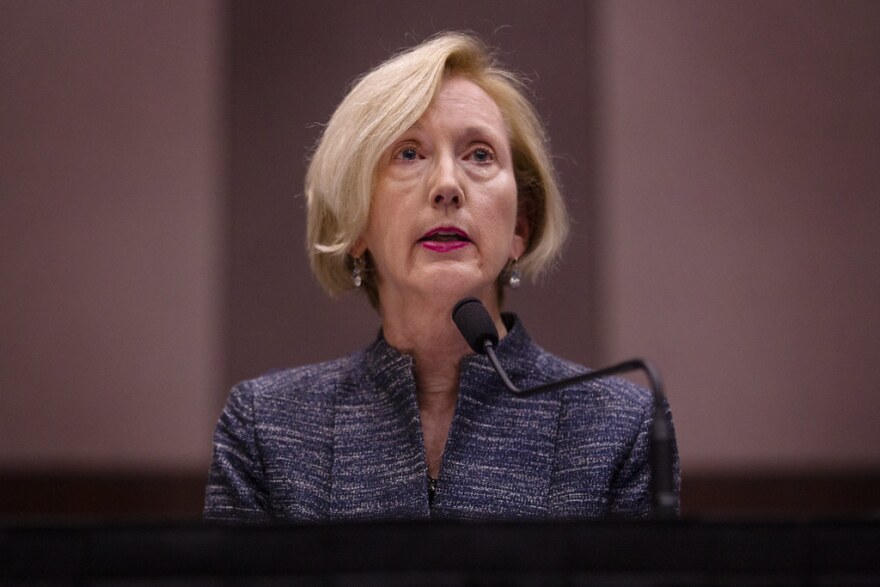Austin's mayor and members of the City Council tried to allay fears about the city's revised rules on homelessness and its push to expand shelter space, at a forum hosted by the Downtown Austin Alliance.
The brunt of Wednesday's discussion focused on the rhetoric surrounding Austinites living on the street – and city efforts to address the issue. It was held a day after council members laid out plans to walk back a key tenet of rules they passed in June that allowed camping, resting and panhandling in many public areas.
WATCH | KUT's Discussion On Homelessness In Austin
The plan would limit camping and sitting or lying down in some areas, like the old rules, while the city moves forward with housing-focused efforts, like building a new emergency shelter in South Austin.
Audience questions focused largely on safety concerns surrounding the revised ordinances – with one attendee asking point-blank whether the city would repeal them.
"We're not going to solve this as a community by sending the problem to somebody else's neighborhood."
Mayor Steve Adler said doing so wouldn't effectively address public health and safety concerns related to homeless encampments. Council's plan could include targeted bans in the downtown area, he said, but a complete ban would force homeless Austinites to seek shelter in surrounding areas.
"It's not like the people disappear. They don't just go away – unless we get them in a home," he said. "Now, I think there are some areas downtown that we should say people shouldn't be camping, sitting and lying because we have health and safety rules. ... We should apply those rules, but we're not going to solve this as a community by sending the problem to somebody else's neighborhood."
Council Member Greg Casar, who championed the ordinance changes, quoted a 1996 article about the frustrations around the camping ordinances.
Since then, he said, the city's solutions have been largely punitive and have resulted in arrest warrants. Casar said the city hasn't invested heavily enough in services like case management and housing, and that the city's new approach should focus more on funding services in line with the plan to end homelessness.
"Between 2014 and 2016, we handed out 18,000 tickets – the vast majority of which turned into arrest warrants – and we did not solve the problem," he said. "We had great organizations doing amazing work housing people, but never to the scale that our Action Plan to End Homelessness demands."
Members of the audience also questioned the timeline, selection and feedback process for the new $8.6-million shelter in South Austin; many of those questions were directed at that neighborhood's council member, Ann Kitchen.
Cleo Petricek of SAFE, a group that opposes the shelter, said the city didn't provide clarity ahead of its decision to select the site near Ben White Boulevard and Bannister Lane. She and others argue the site, which is less than a mile from existing homeless encampments, will invite more encampments, similar to those outside the Austin Resource Center for the Homeless.

"You guys are putting a shelter near a low-income, predominately Hispanic community," she said. "You guys are not engaging with that community. These [neighborhood] children are seeing open sex acts, drug acts."
Council Member Kitchen called Petricek's comments "flat-out not true."
“It is not next to schools," she said. "It is not next to children."
Kitchen promised the city would enact bans on camping near the new shelter.
Adler promised he would personally attend neighborhood meetings as the city embarks on plans to provide temporary and emergency shelter space in every district.
"When we start opening these, because they do need to be around the city, I will go to every one of them, every week to be there with the neighborhood to help ensure that none of them look like what we're experiencing at the ARCH," Adler said.
Council members writ-large also spoke out against misleading information spread on social media, for example, that Austin is attracting more homeless people and is on its way to becoming inundated by its homeless population, like Seattle or Los Angeles.
Adler, who visited both cities, called these aspersions "urban myths." He contended Austin's recent efforts have put it on a better path than those cities.
Council Member Kathie Tovo argued the yearly survey of people experiencing homelessness here suggests the opposite – that the majority are from the Austin area.
"The individuals experiencing homelessness in our community are our neighbors," she said. "They are people who have lived here – sometimes for years – and have become homeless, for the most part, here in Travis County."
Tovo also touted city efforts to spend more on shelter space in East Austin – specifically, on its recent million-dollar investment in the Salvation Army's Rathgeber Center.
Patricia Clark, who’s been homeless on and off for 25 years, said she's glad the city is addressing homelessness, but is frustrated it doesn’t do more for single women like her – who may not be able to get into family shelters.
She was so frustrated, she said, she walked out of the forum.
"What happens next with us?" Clark asked. "What more is it going to take for y’all to see us?”
Clark said she plans to attend the next two forums on homelessness – one at the LBJ Center on Aug. 29 and another in South Austin on Sept. 3 – and will ask those questions of council members.
Meanwhile, City Council plans to act on short- and long-term solutions from City Manager Spencer Cronk in September, when the city is expected to pass a budget allocating a record $62 million toward homelessness.







